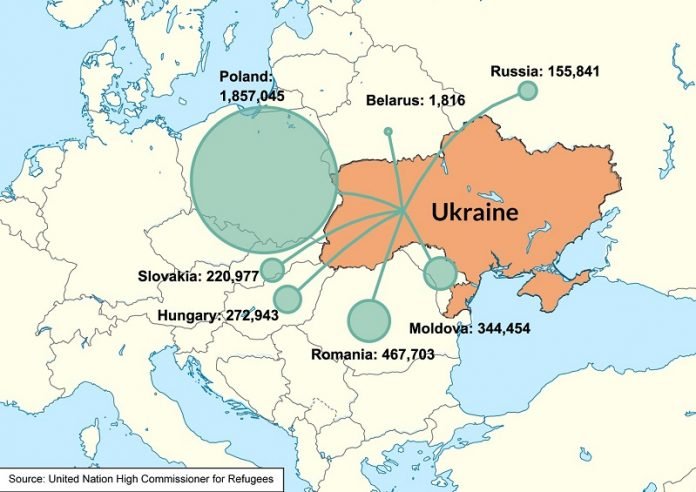
Russian president Vladimir Putin’s invasion of Ukraine has created a refugee crisis the likes of which hasn’t been seen in decades.
More than 2.5 million Ukrainians have fled their country in the roughly three weeks since the invasion began—most of them to the neighboring European countries of Poland, Hungary, Slovakia, and Romania.
“The refugee crisis … has been one of the most troubling aspects, to say the least, of the invasion,” says Serena Parekh, Northeastern professor of philosophy, who has written extensively on refugees and the ethics of forced displacement.
“The sheer number of people leaving the country is nothing that we’ve seen in recent history.”
The demographics of the refugee population are striking, too, Parekh says.
“Of the 2 million refugees who have crossed a border, 1 million are children—this refugee crisis is unique in that the refugees are almost entirely women and children,” Parekh says.
Ukrainian men who are between 18 and 60 years old are banned from leaving the country and encouraged to fight while Ukraine remains under martial law.
For those who can leave, the journey can be harrowing—and sudden.
“To give you a sense of what a refugee from Ukraine might be going through, a common story that I’ve heard is something like this: People start hearing bombs going off outside their buildings, they realize that [the bombs] are very close, so they go to a bomb shelter,” Parekh says.
“They grab a few things—maybe their toothbrush, maybe a stuffed toy for a child—but then they realize they can’t go back.
“They go from the bomb shelter to their car, a bus, a train, and they start this long journey out of the country. They have nothing with them. And because people are leaving at such a high rate, it’s extraordinarily difficult to leave.
Initially people were able to get out in a fairly orderly way, but within a few days, people were lining up for hours—upward of 70 hours—in order to leave Ukraine and be processed largely in Poland.
“These refugees are desperate to get out, they can still hear bombs going off as they’re fleeing, and you hear stories of them getting over the border, and it’s the first time in days that they’re able to take a breath.
And then, of course, they break down and realize all that they’ve lost,” she says.
But there is good news, Parekh says: Largely, Ukrainian refugees have been warmly welcomed into countries around the world, and particularly into the Eastern European countries to which most have fled.
Children are being met at train stations by volunteers handing out chocolate bars, and families are offering to make food and provide rooms for refugee families, Parekh says.
In the United Kingdom, government officials have lifted a cap on the number of Ukrainian refugees who can live with host families, and hosts will receive £350 a month (roughly $450 a month) from the government in return.
“The reason this treatment is so incredibly striking is because it stands in such stark contradiction to how refugees from Syria, Iraq, and Afghanistan were received after 2015 in Europe,” Parekh says.
Officials from countries that are currently throwing open their doors were in many cases hostile to refugees fleeing the Syrian civil war in the first half of the last decade.
The motivating reasons behind these different attitudes are varied and complex, Parekh says—Eastern Europeans have sympathy for their neighbors and know what it feels like to live under Soviet aggression.
But it would be a mistake, she adds, not to consider that bias against Middle Eastern refugees also played a role.
“The more negative way of thinking about this is that it embodies a certain kind of racism where Ukrainians are seen as white and European, and it was unbearable that they could be refugees; whereas it was normal for people from the Middle East and Africa to experience war and trauma,” she says.
Parekh hopes the shift in attitudes toward refugees outlives the crisis in Ukraine.
“It’s heartening to see that this attitude is possible and that it’s possible for a large number of people,” she says.
Written by Molly Callahan.



